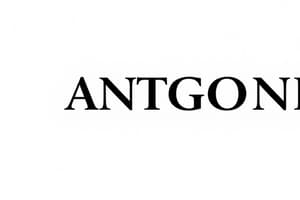Podcast
Questions and Answers
What values does Antigone embody in Sophocles' play?
What values does Antigone embody in Sophocles' play?
- Ambition and deceit
- Rebellion and anarchy
- Personal gain and political power
- Familial duty and reverence for divine law (correct)
Which character in 'Antigone' upholds state laws over personal conscience, leading to tragic consequences?
Which character in 'Antigone' upholds state laws over personal conscience, leading to tragic consequences?
- Antigone
- Creon (correct)
- Haemon
- Ismene
How does Ismene's role contrast with Antigone's in the play?
How does Ismene's role contrast with Antigone's in the play?
- Ismene is hesitant and indirectly involved in Antigone's actions. (correct)
- Ismene is the one who buries Polyneices against Creon's decree.
- Ismene embodies rebellion and defiance.
- Ismene supports Antigone's actions unconditionally.
What does Creon's stubbornness lead to in 'Antigone'?
What does Creon's stubbornness lead to in 'Antigone'?
Which aspect of Greek mythology is central to Sophocles' 'Antigone'?
Which aspect of Greek mythology is central to Sophocles' 'Antigone'?
What do Haemon and Eurydice's deaths in 'Antigone' emphasize?
What do Haemon and Eurydice's deaths in 'Antigone' emphasize?
In 'Antigone', what does Sophocles emphasize regarding human laws and divine laws?
In 'Antigone', what does Sophocles emphasize regarding human laws and divine laws?
How does the historical context of 'Antigone' influence its themes?
How does the historical context of 'Antigone' influence its themes?
What key theme in 'Antigone' explores the struggle between personal loyalties and obligations to the city or nation?
What key theme in 'Antigone' explores the struggle between personal loyalties and obligations to the city or nation?
How does Sophocles use dramatic irony in 'Antigone' to create tension?
How does Sophocles use dramatic irony in 'Antigone' to create tension?
Flashcards are hidden until you start studying
Study Notes
Sophocles' Antigone: An In-depth Analysis
Overview
Sophocles' "Antigone" is a tragic play that delves into the complexities of human morality, family dynamics, and civic order. Set in ancient Greece, it revolves around Antigone, who defies her uncle Creon's decree to bury her brother Polyneices, sparking a series of events with profound implications for Thebes and its royal family. This article explores various aspects of this classic tragedy, including character analysis, Greek mythology, dramatic structure, historical context, and themes.
Character Analysis
The central characters of "Antigone" are Antigone herself, Creon, Ismene, Haemon, and Eurydice. Each character represents different values and beliefs:
- Antigone: She embodies familial duty and reverence for divine law above human decrees. Her unwavering determination to perform funeral rites for her brother despite the consequences highlights her strong sense of obligation.
- Creon: As king, he upholds the laws of the state over personal conscience, which often leads to conflict with others. His stubbornness ultimately results in the deaths of several members of his household.
- Ismene: Initially hesitant to assist Antigone, she ends up being indirectly involved due to circumstances beyond their control. Her role serves as a contrast to her sister's firm convictions.
- Haemon and Eurydice: These two characters represent the tragic outcomes of the central conflict; both commit suicide following the loss of loved ones. Their deaths underscore the destructive nature of extreme positions taken by other characters.
Greek Mythology
"Antigone" draws on elements from Greek mythology, specifically referencing the oedipal curse upon Oedipus' sons and the traditions surrounding burial practices. It also touches upon issues like loyalty to family versus loyalty to the state, which resonated deeply within Greek society at the time.
Dramatic Structure
Sophocles employs a well-crafted plot structure, using tension between personal morality and societal expectations, prophetic warnings from Tiresias, and dramatic irony created by characters' lack of awareness or understanding of higher forces at work against them. The escalating conflicts eventually lead to devastating consequences for all involved.
Historical Context
Written during a period when Athens was expanding its empire and facing increased challenges from Sparta, "Antigone" reflects larger social debates about the balance between individual freedom and collective responsibility. This context adds another layer of interpretation to the play's themes.
Themes
Some key themes in "Antigone" include:
- Family vs. Civic Order: The struggle between personal loyalties and obligations toward one's city or nation is explored extensively throughout the play.
- Divine Intervention: Sophocles emphasizes the importance of respecting divine laws alongside human ones, suggesting that disregard for such principles can have severe consequences.
- Human Conflict: By portraying internal strife within families and communities, "Antigone" offers insights into the destructiveness of extremism and the difficulties faced when trying to maintain harmony amidst opposing viewpoints.
In conclusion, Sophocles' "Antigone" stands out as an enduring piece of literature due to its exploration of timeless themes and complex character interactions set against the backdrop of Greek culture and mythology. Its message regarding the dangers of inflexibility and the need for compromise continues to resonate today, offering valuable lessons about human behavior, decision-making, and the power of conviction.
Studying That Suits You
Use AI to generate personalized quizzes and flashcards to suit your learning preferences.




